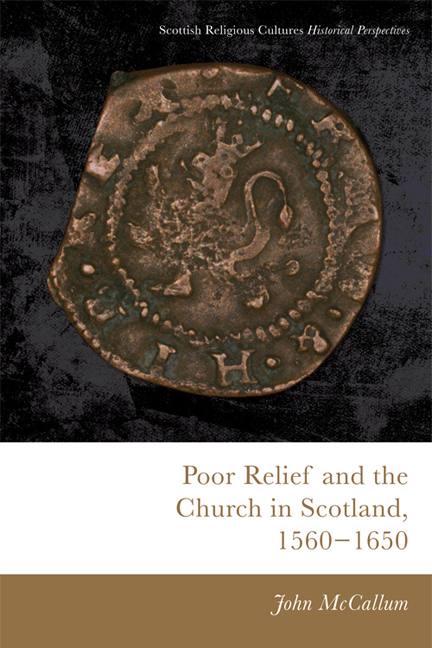Book contents
- Frontmatter
- Contents
- List of Tables
- Acknowledgements
- Conventions
- Abbreviations
- Map of Key Locations Mentioned
- Introduction
- 1 Ideas, Attitudes and Ambitions
- Part I The Development of Kirk Session Poor Relief
- Part II The Nature of Kirk Session Poor Relief
- Conclusion
- Appendix Equivalent Values from Wages and Prices
- Bibliography
- Index
1 - Ideas, Attitudes and Ambitions
Published online by Cambridge University Press: 14 September 2018
- Frontmatter
- Contents
- List of Tables
- Acknowledgements
- Conventions
- Abbreviations
- Map of Key Locations Mentioned
- Introduction
- 1 Ideas, Attitudes and Ambitions
- Part I The Development of Kirk Session Poor Relief
- Part II The Nature of Kirk Session Poor Relief
- Conclusion
- Appendix Equivalent Values from Wages and Prices
- Bibliography
- Index
Summary
Introduction
This book is primarily about what the Scottish church did for (and to) the poor. But before we can assess practice, we need to consider the ideas and attitudes of church and society towards charity, poverty and the poor. This chapter therefore asks how these topics were viewed in sixteenth- and seventeenth-century Scotland. There is naturally a particular emphasis on the approaches of Protestant reformers, in order to contextualise the relief provided by the established church after 1560, but it is important to note that there was substantial continuity from the late medieval period, and also that Protestant reforming attitudes were not unique, but instead drew on wider social attitudes and traditions. Such attitudes are not always easy to glean from the sources for the early modern period, and as is so often the case, it is particularly difficult to access orthodox and conventional views. As Mitchison has noted, charitability is such an obvious and universal value that it is ‘often not specifically expressed in statements on morality’. There was certainly no major body of printed debate or other qualitative writings directly addressing the subject at length in Scotland during the years covered by this book. Yet close reading of some key reforming texts, as well as a wider range of literary texts, treatises and various other prose works reveals that the subject was often discussed or utilised, and was a point of particular interest for those concerned with reform of various shades in the mid-sixteenth century. It continued to play a role in understandings of piety and morality into the seventeenth century as well.
Inevitably, in searching for evidence on how Scottish writers treated this subject, one has to be open-minded and even magpie-like in the identification and selection of texts. At the same time, there is also a need for great caution in defining the subject-matter. Poverty is here defined roughly as in the rest of the book: that is as a level of serious material deprivation which prompts a need for assistance from external sources (whether that support is necessarily forthcoming or not).
- Type
- Chapter
- Information
- Poor Relief and the Church in Scotland, 1560–1650 , pp. 27 - 50Publisher: Edinburgh University PressPrint publication year: 2017



